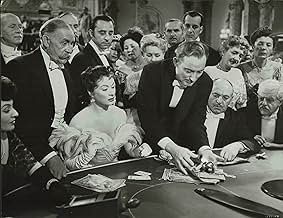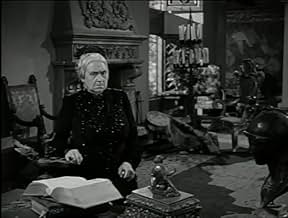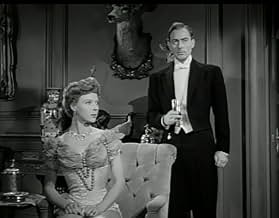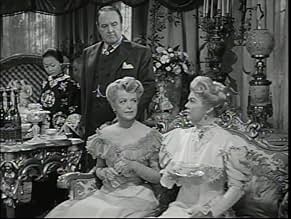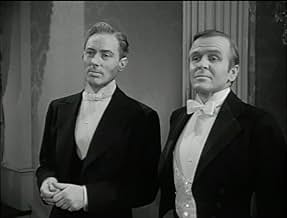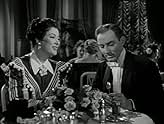Ajouter une intrigue dans votre langueA beguiling international jewel thief loses her heart.A beguiling international jewel thief loses her heart.A beguiling international jewel thief loses her heart.
- Director
- Writers
- Stars
Wong Artarne
- Chinese Servant
- (uncredited)
Jimmy Aubrey
- Coachman
- (uncredited)
Eugene Borden
- French Detective
- (uncredited)
Nina Borget
- Patron
- (uncredited)
George Calliga
- Patron
- (uncredited)
Steve Carruthers
- Party Guest
- (uncredited)
Albert Cavens
- Servant
- (uncredited)
Spencer Chan
- Chinese Servant
- (uncredited)
Avis en vedette
The Law and the Lady is an unnecessary remake of The Last of Miss Cheyney, which was filmed twice before (there is a Norma Shearer version and a Joan Crawford version, both of which are superior). This was resident MGM queen Greer Garson's turn in the role, in which she is miscast as a lady jewel thief. Although Garson was a beautiful woman and aged extremely well, she is slightly too mature for the role. At 46, she is still very pretty, but not effective at playing a mysterious and alluring femme fatale. As a poor woman masquerading as a lady in turn of the century San Francisco society, she is just a little bit too convincing as a lady. Greer Garson was perhaps unable to portray women of the lower class. She is entirely too classy to make this character work.
Furthermore, this appears to be a low-budget production, tailored for a fading star rather than a brilliant one. It is shot in black and white, the sets are nothing too extraordinary, and it has a shot-on-the-studio-lot feel to it, which makes it seem both dated and stuffy. This story had been around a long time by 1951, and it comes to the screen as tired as one would expect.
The writers apparently tried to inject some life in it through rewriting the script and changing some story elements, but overall it's nothing new. It's a mediocre film with mostly mediocre performances, even by the usually radiant Garson. One bright spot is Marjorie Main--she is indeed a hoot.
The Law and the Lady is, however, not a complete waste of time and if taken as light entertainment is a somewhat enjoyable movie for a rainy afternoon.
Furthermore, this appears to be a low-budget production, tailored for a fading star rather than a brilliant one. It is shot in black and white, the sets are nothing too extraordinary, and it has a shot-on-the-studio-lot feel to it, which makes it seem both dated and stuffy. This story had been around a long time by 1951, and it comes to the screen as tired as one would expect.
The writers apparently tried to inject some life in it through rewriting the script and changing some story elements, but overall it's nothing new. It's a mediocre film with mostly mediocre performances, even by the usually radiant Garson. One bright spot is Marjorie Main--she is indeed a hoot.
The Law and the Lady is, however, not a complete waste of time and if taken as light entertainment is a somewhat enjoyable movie for a rainy afternoon.
Guess the butler got left out of the title, but he was so spot-on with his many graces and polish. That cape in the early segment was quite dashing, along with the top hat and stick. Did not like Ms. Garson's dark hair in this or in "Mrs. Parkington." It just doesn't suit her, but she is still quite lovely. Her voice alone is ample attraction. "When Thieves Fall Out" would be a good title, maybe adding, "
And Make Up." Lots of irony there at the rancho, with everyone's righteous indignation fizzling out when their dirty linen got a genteel airing. Then, just when everything was all smiles again, along comes the extradition agent, all over a measly hundred pounds. What a bore. Oh well, maybe time off for good behavior will come sooner than expected, what with all the repository of charm brought to bear from the respective parties. Then, tally ho, off to the country house, manor house, town house and/or shooting box. This is so changed around, one needn't compare with previous editions. Certainly an interesting group of scenarios. Fun picture.
Greer Garson is the lady in question in "The Law and the Lady," a 1951 film also starring Michael Wilding, Marjorie Main and Fernando Lamas. It's a loose remake of "The Last of Mrs. Cheyney." Here, Garson plays a former British household maid at the end of the 19th Century who hooks up with the brother of her ex-employer. They sort of fall into a con game and decide to keep going with it. After being asked to leave several countries when they're discovered cheating at gambling, they travel to America and San Francisco high society. They set their sights on a wealthy woman (Main) and her necklace. Complications arise.
This is a good movie with some very funny dialogue, especially in the beginning - when the lady of the house informs Garson she won't get a reference, she replies, "I won't be needing one. I intend to become a lady, and there are no character references necessary for that." Garson plays her role in a very cool, offhanded manner that is very effective. Wilding is amusing as her partner in crime, and Main is a riot as a tough old rich widow.
All in all, a very charming movie and worth seeing.
This is a good movie with some very funny dialogue, especially in the beginning - when the lady of the house informs Garson she won't get a reference, she replies, "I won't be needing one. I intend to become a lady, and there are no character references necessary for that." Garson plays her role in a very cool, offhanded manner that is very effective. Wilding is amusing as her partner in crime, and Main is a riot as a tough old rich widow.
All in all, a very charming movie and worth seeing.
"The Law and the Lady" is a surprisingly good movie that doesn't get shown a lot for some reason. Greer Garson, Michael Wilding, Marjorie Main, and Fernando Lamas all shine in their roles. Wilding's character convinces Garson's to team with him as globetrotting con artists who wind up in California trying to cheat a disarmingly candid (and as always, tough minded) Main. Their plans are further complicated when Garson starts to fall for Lamas and starts to rethink her relationship with Wilding.
The comedy is light-hearted and avoids taking itself too seriously. Knopf, brother of the famous publisher, only directed a few films, and this was his only effort after the early 1930's. He was able to get good performances from his excellent cast.
1960's TV fans will recognize Natalie Schafer (Gilligan's Island) and Hayden Rorke (I Dream of Jeannie) playing small but noticeable roles.
The comedy is light-hearted and avoids taking itself too seriously. Knopf, brother of the famous publisher, only directed a few films, and this was his only effort after the early 1930's. He was able to get good performances from his excellent cast.
1960's TV fans will recognize Natalie Schafer (Gilligan's Island) and Hayden Rorke (I Dream of Jeannie) playing small but noticeable roles.
This poor knock-off, starring a past-her-prime Greer Garson looks like what it is: a conflation of all the MGM contract players squeezed into roles they weren't necessarily congruent with. Garson, unfortunately, for the time, was not well accepted in coquettish female roles because of her age. Her heyday came and went with the stirring Mrs. Miniver when she was head of a family. Now, she needed a family to mother and MGM has thrown her out to be a jewel thief.
MGM, in fact, did her much injustice during the 1950s as they miscast her over and over again in search for that second Mrs. Miniver, which was never to come.
Other actors, like Myrna Loy, got out of their contracts with the studio and negotiated independently for roles. Loy smartly chose motherly roles as she grew older and did not try to hold on to her youth: "The Best Years of Our Lives", "Mr. Blandings Builds His Dream House", the sixth and final "Thin Man" and "Cheaper by the Dozen" (a big box office hit in 1950 that is not owned by TCM and is subsequently never aired).
Garson remained with MGM and they kept the movies coming. Someone in management must have really liked her.
Other actors, like Myrna Loy, got out of their contracts with the studio and negotiated independently for roles. Loy smartly chose motherly roles as she grew older and did not try to hold on to her youth: "The Best Years of Our Lives", "Mr. Blandings Builds His Dream House", the sixth and final "Thin Man" and "Cheaper by the Dozen" (a big box office hit in 1950 that is not owned by TCM and is subsequently never aired).
Garson remained with MGM and they kept the movies coming. Someone in management must have really liked her.
Le saviez-vous
- AnecdotesThis is a remake of MGM's The Last of Mrs. Cheyney (1937) with Joan Crawford, William Powell, and Robert Montgomery. That movie is the remake of MGM's The Last of Mrs. Cheyney (1929) with Norma Shearer and Basil Rathbone.
- Gaffes(at around 39 mins) As Nigel and Jane converse, the boom mic shadow can be seen in the mirror on the far wall moving across the door as it closes.
- Citations
Jane Hoskins: I'm not interested in the character, Baroness. I'm thinking of becoming a lady, and for that, no character is necessary.
- ConnexionsVersion of The Last of Mrs. Cheyney (1929)
Meilleurs choix
Connectez-vous pour évaluer et surveiller les recommandations personnalisées
- How long is The Law and the Lady?Propulsé par Alexa
Détails
- Date de sortie
- Pays d’origine
- Langues
- Aussi connu sous le nom de
- The Law and the Lady Loverly
- Lieux de tournage
- société de production
- Consultez plus de crédits d'entreprise sur IMDbPro
Box-office
- Budget
- 1 193 000 $ US (estimation)
- Durée1 heure 44 minutes
- Couleur
- Rapport de forme
- 1.37 : 1
Contribuer à cette page
Suggérer une modification ou ajouter du contenu manquant

Lacune principale
By what name was The Law and the Lady (1951) officially released in Canada in English?
Répondre

